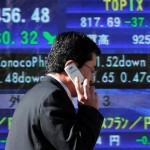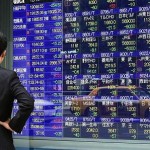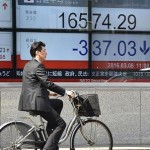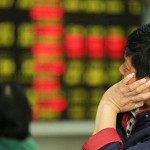Asia markets slip amid Fed concerns, oil fall
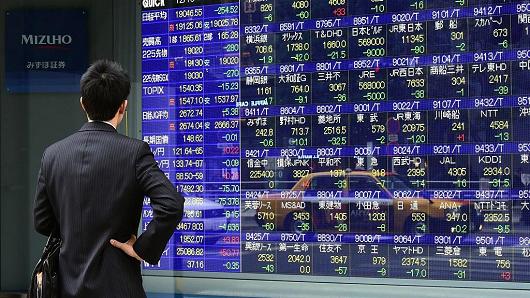
Asia markets ended lower Thursday, amid fresh declines in oil prices and concerns the U.S. Federal Reserve may hike interest rates sooner than expected.
Japan’s Nikkei 225 ended down 108.65 points, or 0.64 percent, at 16,892.33, while South Korea’s Kospi index fell 9.15 points, or 0.46 percent, to 1,985.97. Hong Kong’s Hang Seng index was down 1.26 percent.
Chinese markets were mixed, with the Shanghai composite off by 0.67 percent, while the Shenzhen composite was up 0.18 percent.
Down Under, the benchmark ASX 200 closed down 58.06 points, or 1.13 percent, at 5,084.20.
While last week’s Fed meeting was viewed as dovish, with the central bank saying it would likely increase rates twice this year, down from its previous forecast of four times, officials now appear to be putting a possible April hike back on the table.
St. Louis Fed President James Bullard was the latest to join a growing chorus of Fed officials who say it’s time for the Fed to move.
“We can look at April and see what the data look like when we get to April,” Bullard told Bloomberg News on Wednesday. His comments came shortly after Philadelphia Fed President Patrick Harker said the Fed should consider another hike as soon as next month.
In a morning note, Mizuho Bank said, “Expectations of an earlier Fed tightening are now seeping through markets, albeit at a slow pace, with fewer investors willing to place bets on what the Fed say they might do, especially after what they have actually done by pushing back rate hikes.”
That pushed up the dollar and weighed on commodity prices.
In the currency market, the dollar index, which weighs the U.S. dollar against a basket of currencies, was up 0.14 percent at 96.178 as of 2:05 p.m. HK/SIN time.
Down Under, the Australian dollar also retreated against the U.S. dollar, flirting with levels under $0.75 in late afternoon local time, after commodity currencies were sold off overnight. The Australian dollar was fetching $0.7494 after the stock market closed, compared with levels as high as $0.7643 overnight.
David de Garis, director and senior economist for fixed income, currencies and commodities at the National Australia Bank, said in a morning note, the Aussie felt the “brunt of the selling” in the wake of “weaker commodity prices, somewhat jittery equity markets and hints of a renewed appetite for the U.S. dollar (or at least some selling of the euro and British pound in the wake of the Brussels terrorist incidents).”
The Japanese yen remained at the 112 level against the greenback, with the dollar/yen pair trading up 0.38 percent at 112.78 in the afternoon local time, off a session low of 112.27.
Major Japanese exporters finished down, with Toyota falling 1.56 percent, Nissan off 0.98 percent and Honda down by 1.6 percent. A stronger yen is usually a negative for exporters as it reduces their overseas profits when converted to local currency.
Before market open, the People’s Bank of China set the yuan mid-point fix at 6.5150 to the dollar, compared with Wednesday’s fix of 6.4936. The dollar/yuan pair traded up 0.1 percent at 6.5101.
In Australia, the financials subindex fell 2.5 percent, weighing the broader market.
Australian banking stocks were sharply lower, with ANZ closing down 5.21 percent, Commonwealth Bank of Australia off by 2.45 percent,Westpac down 4.58 percent and NAB falling 3.53 percent.
Earlier today, ANZ told the market it was expecting its first half of 2016 credit charges to increase by at least an additional 100 million Australian dollars ($75.10 million) on top of the more than A$800 million it had anticipated in February due to resource-related exposures.
Evan Lucas, market strategist at spreadbetter IG, told CNBC the announcement “[rubbed] off on all Australian banks.”
Australian miners ended mostly lower, following weaker commodity prices overnight. Base metals on the London Metal Exchange (LME) were mixed, with three-month copper flat while three-month aluminum reversed losses to be up 0.81 percent.
Among major Aussie miners, Rio Tinto closed down 3.56 percent, BHP Billiton was off by 3.41 percent and Fortescue was lower by 2.28 percent.
Chinese metal plays were also lower, with Baoshan Steel down 1.12 percent, Yunnan Copper off 4.45 percent and Aluminium Corp. down 3.09 percent.
In corporate news, Japan’s Nikkei reported that trading housesMitsubishi Corp. and Mitsui & Co. are both expected to post their first-ever group net losses in the fiscal year ending March 31 on impairment losses on resource projects. The paper said Mitsubishi’s group net loss is expected to be more than 100 billion yen ($887 million).
Reuters also reported that a slide in energy and metal prices forced Mitsui & Co. to book 260 billion yen in writedowns.
Shares of Mitsubishi Corp. closed down 4.07 percent, while Mitsui & Co tumbled 7.51 percent.
Oil prices retreated further during Asian hours, with U.S. crude futures slipping 0.65 percent to $39.53 a barrel, after falling 4 percent overnight. Global benchmark Brent was down 0.32 percent at $40.34, after slipping 3.2 percent in U.S. hours.
Reuters reported the U.S. government’s Energy Information Administration said crude stockpiles rose 9.4 million barrels last week, which was three times the 3.1 million barrels expected by analysts in a Reuters poll.
Asian energy stocks were mostly lower, with Woodside Petroleumdown 0.7 percent and Inpex off by 5 percent. Mainland Chinese energy plays were mostly lower, with Sinopec down 4.35 percent.
In Australia, Santos closed up 2.81 percent at 4.03 Australian dollars. On Thursday, China gas distributor ENN agreed to buy a nearly 12 percent stake in the Australian energy company from Hony Capital for $750 million. Citigroup said in a note Thursday that the deal implies ENN is paying around A$4.85 a share, marking a premium to the market price.
Overnight, major U.S. indexes closed lower, with the Dow Jones industrial average off 0.45 percent, the S&P 500 down 0.64 percent and the Nasdaq composite lower by 1.1 percent.
No major data are expected in Asia, while Singapore will release its budget statement later in the day.
Source: CNBC









